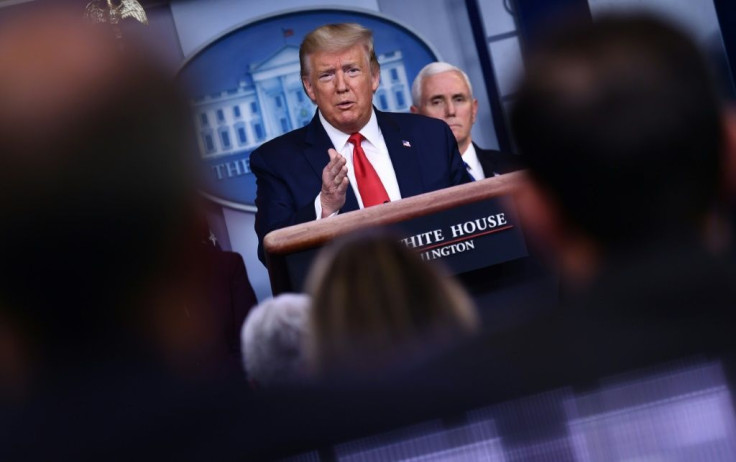Trump Wanted Call-In Radio Show, But Didn't Want To Compete With Limbaugh

KEY POINTS
- In March, Trump considered hosting a daily 2-hour radio show with call-in
- He decided against it over concerns about encroaching on Rush Limbaugh's show
- The idea was ultimately behind the decision to hold daily press briefings
Most Americans are familiar with President Donald Trump’s daily coronavirus press briefings at the White House. As it turns out, this may have been a repackaged version of an idea originally floated by the president in March: A radio show that would air for two hours every day.
Trump’s proposed radio show would feature him taking calls from listeners on an open phone line without screening, according to three officials who spoke with the New York Times. However, Trump quickly backed away from this suggestion, realizing he would not want to compete with Rush Limbaugh. Limbaugh is a popular conservative radio personality who hosts three-hour radio shows on weekdays.
Officials present when Trump made his proposal said that they were caught off guard when he suddenly backed away from the idea. Suggestions to hold the radio addresses in the morning or on weekends to work around Limbaugh’s broadcast didn’t convince Trump, who said he wanted to avoid stepping on the radio host’s toes — the only reason he was ultimately against the idea.
Trump and Limbaugh have long been political allies, with the radio host emerging as an early supporter of Trump’s bid for the presidency in 2016. In the time since, Limbaugh has consistently gone to bat for the president against his critics; in more recent times, Limbaugh has repeatedly argued that the coronavirus pandemic is comparable to the common cold and that the panic around it is only intended to undermine Trump’s administration.
Earlier this year, Trump presented Limbaugh with the Presidential Medal of Freedom, the highest honor a civilian can attain, during the State of the Union address.
The influence Limbaugh holds over much of Trump’s key voting demographic hasn’t been lost on the president. Each week the radio host boasts 15.5 million listeners, primarily conservatives, making it the most popular radio talk show in the country.
In some regards, Limbaugh’s show provides Trump with a type of instant feedback on his actions and proposals he can’t get any other way. As a call-in show, Limbaugh can make certain statements – often echoing the president’s – to which listeners can immediately voice their reactions, acting as a barometer of sorts.
While Trump may not have gotten his radio show, his press briefings continue daily – in one case this week, stretching to well over two hours.
© Copyright IBTimes 2024. All rights reserved.






















